Dragan Stojkovic, the talented former midfielder, gained widespread recognition as the head coach who led Serbia to qualify for the 2022 FIFA World Cup. Fluent in multiple languages, Stojković’s story is one of both talent and dedication. Known affectionately as “Piksi,” a nickname he earned as a boy from the cartoon Pixie and Dixie and Mr. Jinks, the moniker stuck with him throughout his life, even during the peak of his coaching career. That name, “Piksi,” seems to have brought Dragan a stroke of good fortune, helping him carve out a lasting legacy in football.

Piksi’s Influence: The Life Journey of Dragan Stojković in Football
Stojković is more than just a coach—he is a football icon in Serbia. During his playing days, he earned one of Serbia’s highest honors, being one of only five players awarded the prestigious “Star of the Red Star.” From his early days on the pitch to his role on the sidelines as a manager, his journey exemplifies perseverance, talent, and the kind of leadership that has earned him admiration on the global football stage.
During his playing days, Dragan Stojković was a formidable presence on the field. He guided his team to two victories in the Yugoslav First League and played a crucial role in reaching the semi-finals of the UEFA Cup. His exceptional skills earned him the nickname “the Maradona of the Balkans.” Unfortunately, injuries hampered his ability to reach his full potential, cutting his career short and preventing him from achieving even greater heights.
Welcome to the fascinating story of Dragan Stojković, where we uncover not just his accomplishments but also the personal moments that shaped him into the legend he is today.
Preamble:
Dragan Stojković’s journey encompasses not only his remarkable achievements on the pitch but also a deep exploration of his background. His biography delves into key aspects of his early life, highlighting his childhood, family, and the influential figures who shaped him. Born to Desanka and Dobrivoje Stojković, Dragan’s upbringing was enriched by his close relationship with his wife, Snežana, and their children—Anja Valente, Andrea, and Marko—also plays a significant role in his life narrative.
Our goal is to quench your curiosity about Dragan Stojković’s life with a comprehensive biography. To enhance your experience, we’ve put together a photo gallery that captures pivotal moments from his early soccer days all the way to his rise as a football icon.
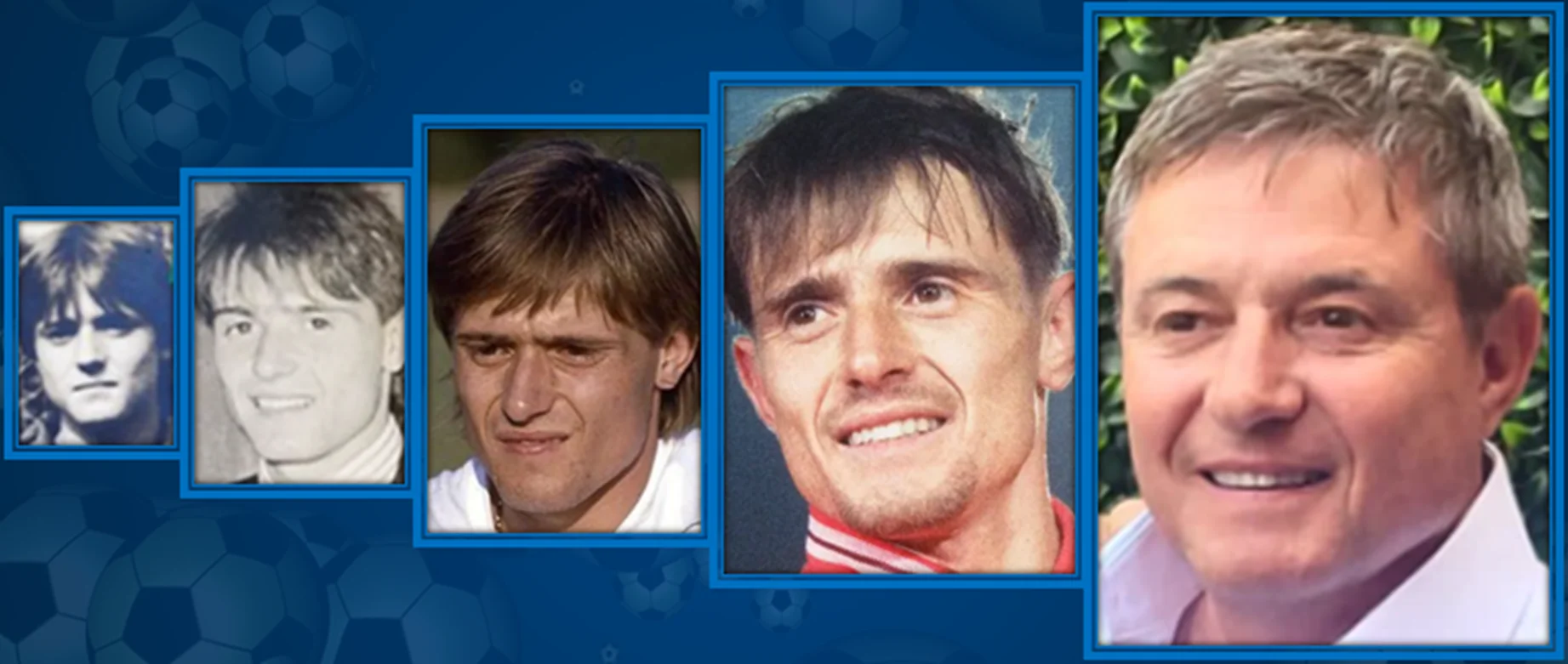
Building a Legacy: A curated photo of Dragan Stojkovic from his early career till his popularity.
Dragan Stojkovic’s Childhood Story:
For Biography starters, he bears the nickname ‘Piksi.’ However, there are various variations to Stojkovic’s nickname, including Pixy and Pixie. Nevertheless, his full name is Dragan Stojkovic.
The Soccer Boss was born on the 3rd day of March 1965. His birth occurred on a welcoming Wednesday under the Pisces Zodiac Sign.
Dragan Stojkovic came into the world to his wonderful parents, his father and mother, in the third largest city in Serbia, Nis in SR Serbia, SFR Yugoslavia, the now-defunct Yugoslavia.
But then we’re unsure if the skilled soccer player has brothers or sisters. It’s possible that he’s the only child, receiving lots of care and love from his family. Behold a photo of one of his parents.
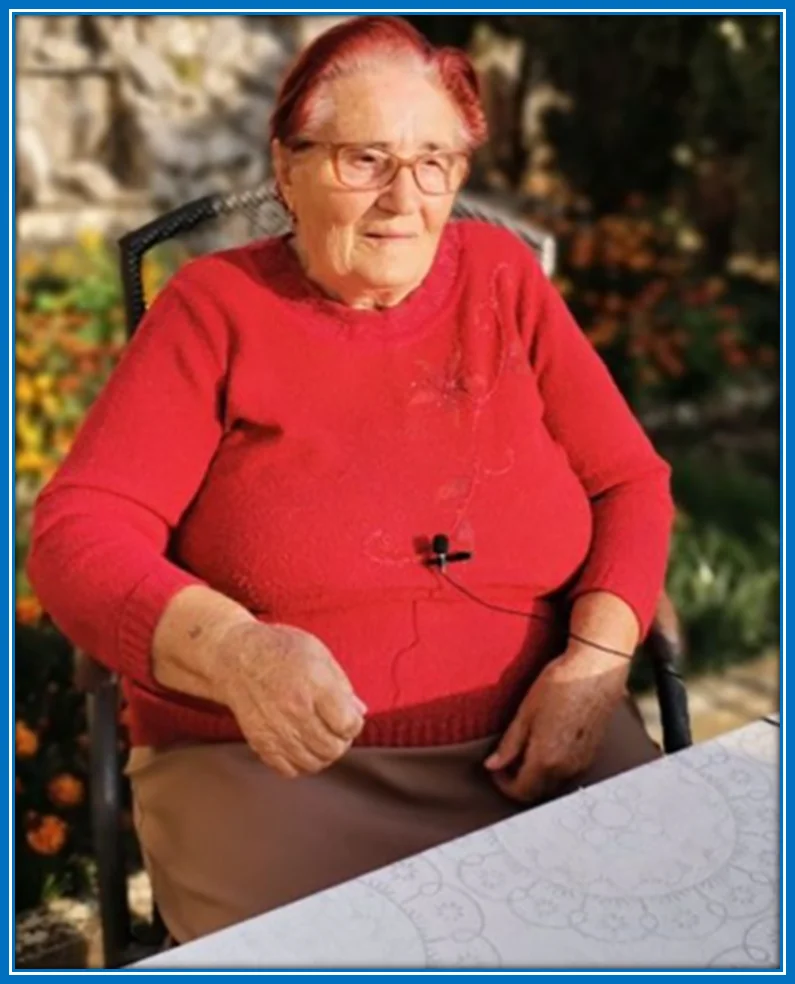
Encountering the Inspirational Figure Behind Dragan Stojkovic – Meet Stojkovic’s amazing Mother. Photo Source: Telegraf
Growing-Up:
Before delving into his football career, it’s essential to understand Stojkovic’s early life and upbringing. Born to Dobrivoje and Desanka in Nis, SR Serbia, SFR Yugoslavia, he spent his formative years in the Pasi Poljana community near Nis.
Growing up in this environment likely gave him a strong sense of community and family values, which may have contributed to his character development and resilience later in life.
During his childhood, Stojkovic earned the nickname “Piksi.” The nickname was derived from the character Pixie in the cartoon “Pixie and Dixie and Mr. Jinks.”
This moniker likely stuck with him due to his resemblance to the character or perhaps his mischievous nature, mirroring the playful and adventurous spirit of the cartoon character. In all, his mother describes him as a born winner from childhood.
Piksi is known for his generosity in his childhood village. Even today, Piksi treasures his childhood friendships, especially with his schoolmate, who is nicknamed Gaci.
It’s in Gaci’s house where the soccer geek meets his daughter-in-law, Jovana Mitrovic, highlighting the enduring bonds from Piksi’s early years.
Dragan’s childhood was marked by his curiosity and eagerness to learn, as evidenced by his acquisition of multiple languages beyond his native Serbian.
His ability to speak English, French, Italian, and some Japanese showcases a remarkable aptitude for languages, indicating a thirst for knowledge and a willingness to engage with different cultures.
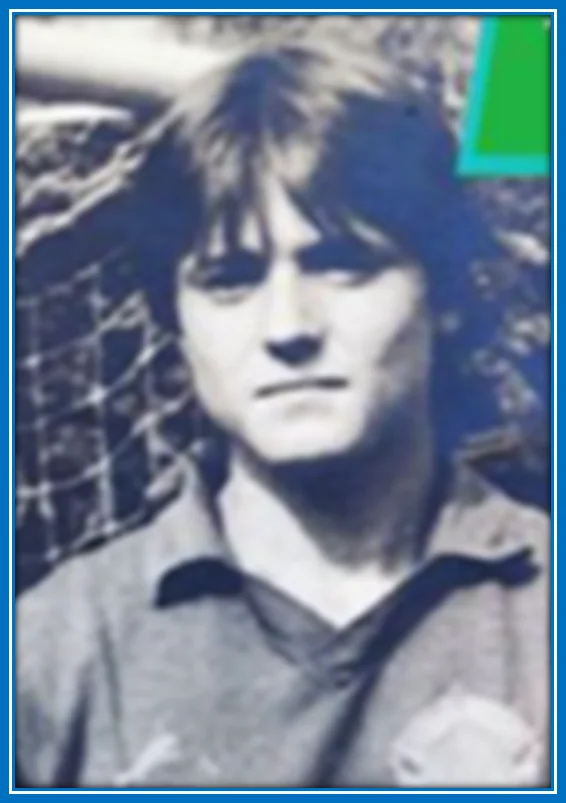
A Rare Glimpse into Dragan Stojkovic’s Early Years. Image Credit: Telegraf
Dragan Stojkovic’s Early Life (Football):
The Celebrated Sportsman’s passion for Soccer blossomed during childhood in the Pasi Poljana community near Nis, Serbia.
Like many young children, he got drawn to the game through exposure to local matches, playing with friends in the neighbourhood, or watching football matches on television.
Growing up in a country where football holds immense cultural significance. Thus, Stojkovic got surrounded by the sport from an early age.
The thrill of football—the electric atmosphere of matches, the strong bonds between teammates, and the rush of competition—captured Stojković’s imagination and deepened his love for the game.
As he began playing, whether in casual games with friends or structured youth leagues, Stojković quickly realized both his talent and passion for football.
The joy of scoring goals, making saves, and contributing to his team’s success would have reinforced his love for football and motivated him to continue playing and improving.
Additionally, Stojkovic may have been inspired by footballing heroes and role models from Serbia and worldwide. Watching skilled players showcase their talent on the international stage could have ignited his ambition to pursue a career in professional football.
His journey from a young enthusiast kicking a ball around in his neighbourhood to a professional midfielder reflects the power of passion and dedication in shaping one’s life path.

A Captivating Portrait: An epic photo of Dragan Stojkovic. Photo Source: Thegeopost
Dragan Stojkovic Family Background:
The legendary football coach, Piksi, hails from the village of Pasi Poljana, where his mother, Desanka, still resides.
Born and raised in this humble setting, his journey from these narrow village streets to the pinnacle of football fame is a testament to his dedication and talent.
Though there are no details about his parents’ careers, Piksi’s parents supported his dreams wholeheartedly, recognizing his innate talent and drive despite the challenges of their modest lifestyle.
His upbringing in this close-knit community instilled in him values of humility, hard work, and compassion, which continue to shape his character and influence his coaching.
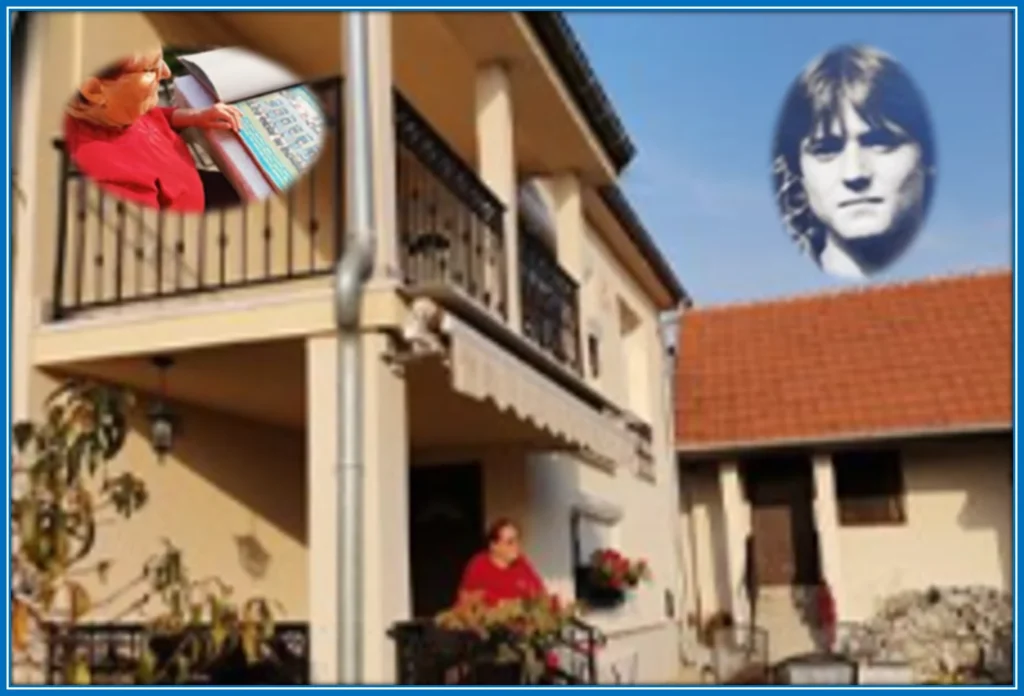
Dragan Stojkovic’s Remarkable Mother at Their Modest Home Reveals His Humble Beginnings. Photo Credit: Telegraf, Telegraf
Dragan Stojkovic’s Family Life:
While details about Dragan Stojkovic’s family members remain private, it’s evident that they play a pivotal role in his sports career. Behind the scenes, his loved ones provide invaluable support and encouragement as he navigates his professional journey.
As we await further information, it’s clear that Stojkovic’s family is a cornerstone of his life’s strength and motivation.
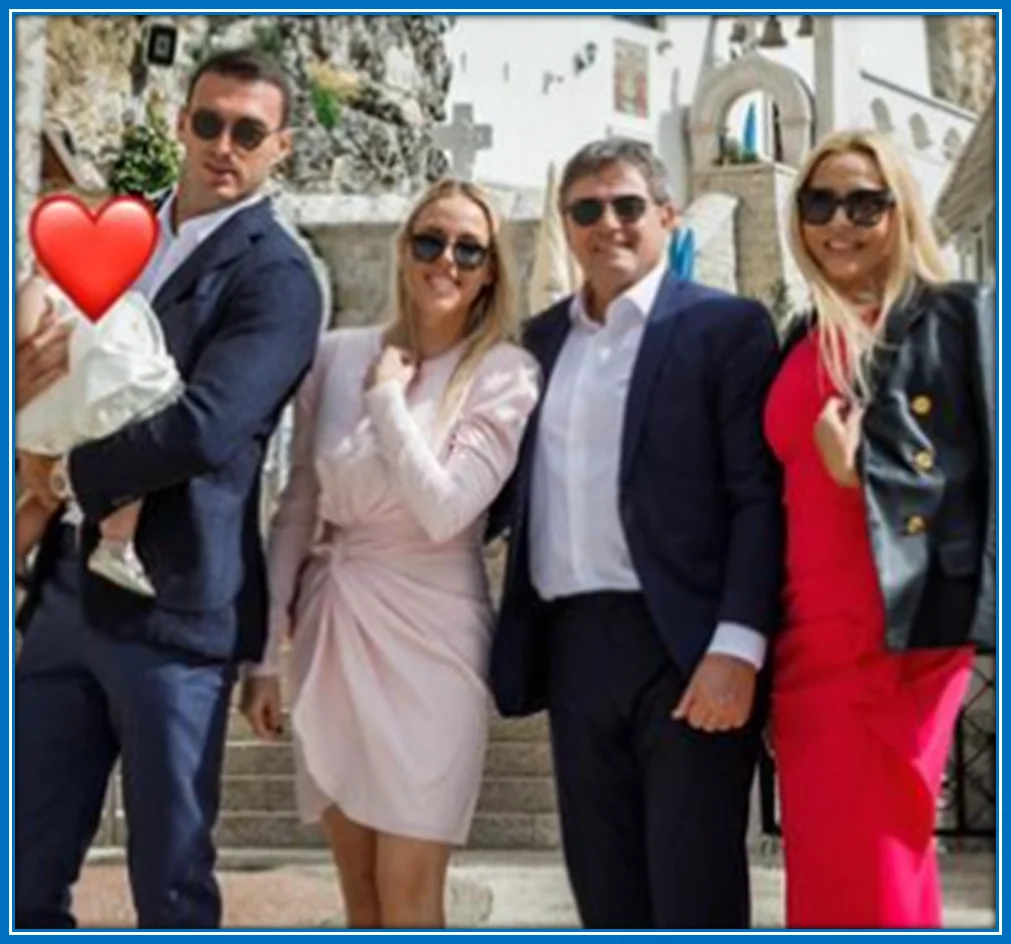
A beautiful photo of Dragan Stojkovic with family at his granddaughter’s Christening. Source: Instagram.com/draganstojkovicpixy/
Dragan Stojkovic’s Father:
Piksi’s Dad, Dobrivoje, appears to have supported Piksi’s journey to greatness in football. While specific details about him are not provided, it’s evident that he played a crucial role in Piksi’s upbringing.
As a result instilling values of dedication, perseverance, and hard work. Like many fathers, Piksi’s dad likely served as a source of inspiration and guidance. He encouraged his son to pursue his passion for football with determination and commitment.
Whether attending Piksi’s matches, offering encouragement, or simply being a steady presence, Dobrivoje undoubtedly shaped the man and athlete he would become.
While his exact contributions may not be fully detailed in the text, it’s clear that Piksi’s father played an integral role in supporting his son’s dreams and aspirations. Together with Piksi’s mother, he helped lay the foundation for Piksi’s success, both on and off the field.
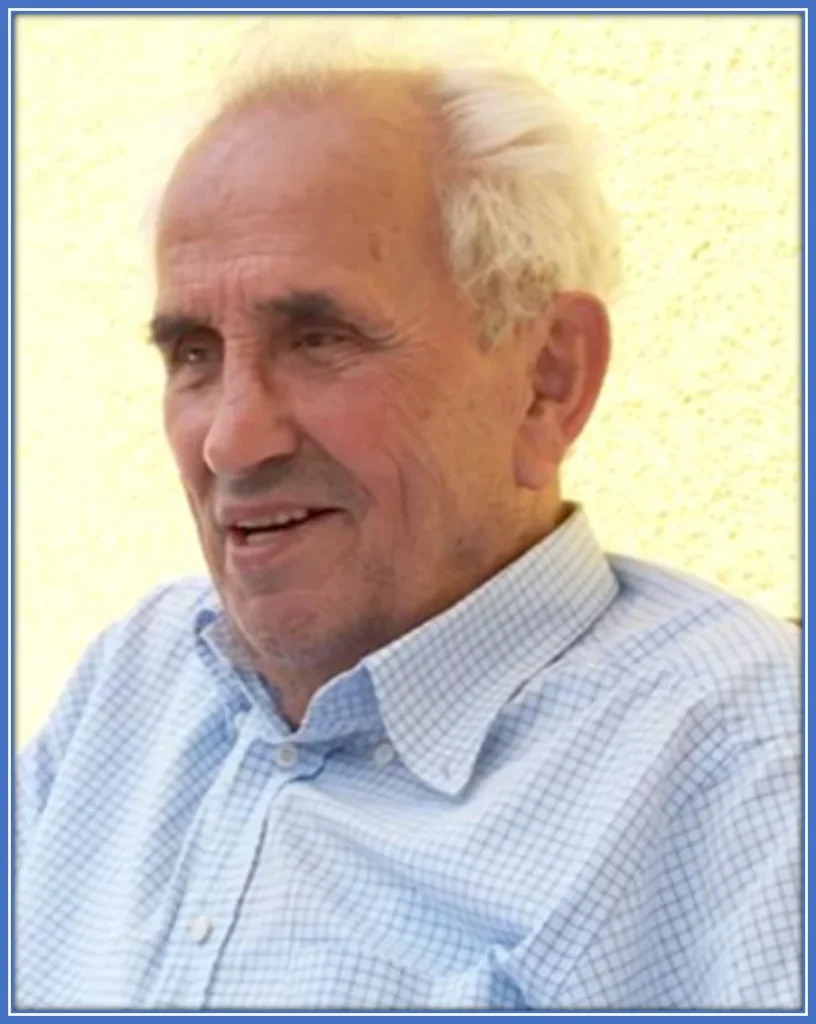
Encounter with Zlatko Dalic’s Revered Father: A Glimpse into the Guiding Light Behind the Managerial Maestro’s Success. Image Source: N1info
Dragan Stojkovic’s Mother:
Piksi’s mum, Desanka, epitomizes maternal pride and unwavering support. Living in the quiet village of Pasi Poljana, she fondly recalls Piksi’s childhood. Desanka nurtured Piksi’s dreams with unconditional love and encouragement.
Throughout Piksi’s illustrious career, Desanka remained his steadfast anchor, offering wisdom and comfort during triumphs and challenges.
Her role extended beyond mere support; she was Piksi’s confidante, his rock during moments of doubt, and his biggest cheerleader in times of victory.
Desanka’s love for her son knows no bounds. She beams with pride as she recounts Piksi’s achievements, from his humble beginnings in the village to leading the Serbian national team to success on the world stage.
Her unwavering belief in Piksi’s abilities and steadfast support played a pivotal motherly role in shaping both his character and career.
In essence, Desanka is more than just Piksi’s mother. She symbolizes maternal strength, resilience, and unconditional love. Her influence transcends borders, grounding Piksi in his roots while empowering him to reach for the stars.

Encountering the Woman Behind Dragan Stojkovic: A Tribute to His Remarkable Mother. Credit: Telegraf
Dragan Stojkovic Siblings:
As mentioned in his childhood tale, it’s unclear if the soccer geek has siblings or if he’s the only child in his family. Regardless, his parents undoubtedly offer him unwavering love and support.
Their presence ensures that he grows up in a nurturing environment. As such, it provides him with the stability he needs to thrive emotionally. This strong support system boosts his confidence and helps him develop resilience as he pursues his football career.
Dragan Stojkovic Relatives:
The soccer enthusiast keeps his extended family details private to shield his loved ones from excessive public attention. However, like many, he cherishes his relationships with family members.
He likely has aunts, uncles, grandparents, cousins, nephews, nieces, and in-laws who are important to him. His daughter-in-law is named Jovana Mitrovic.

A dazzling photo with family relations. Source: Instagram.com/draganstojkovicpixy/
Dragan Stojkovic Wife – Snezana Stojkovic:
Amidst the Serbian athletes’ demanding lifestyle, training, frequent travels and media attention, Dragan Stojkovic is in a thriving relationship. He is not single but married to the love of his life is Snezana Stojkovic.
Snezana, also known as Snow White, the beloved wife of famous footballer Dragan. She’s often hailed as the “First Lady of Serbian Football” due to her enduring support for her husband throughout his career.
Despite her age, Snežana maintains a youthful appearance, boasting a million-dollar smile and a stunningly sculpted body that makes her look much younger. Snezana and Dragan’s love story is not typical—they got married twice!

Dragan Stojkovic with the love of his life. Photo Origin: Instagram.com/draganstojkovicpixy/
More about Snezana Stojkovic:
Snežana and Dragan marked twenty years of marriage with a church wedding in 2011 at the Alexander Nevsky Orthodox Church in Paris.
However, although their marriage was filled with love, it had challenges and disagreements. Originally planning to wed in Belgrade’s Cathedral, they changed their minds at the last minute.
Their children attended, and Snežana’s godmother was Ivana Mišković Karić, while Dragan chose Dragan Trivan. Interestingly, they didn’t buy new wedding rings but engraved another date.
Their marriage had its ups and downs, which Snezana discussed in interviews. She joked about working hard for their marriage and emphasized the importance of effort. Dragan’s fame brought pressure, making it tough to balance their relationship.
Snezana prioritized their marriage over her professional ambitions, putting aside her architecture studies when they moved abroad. She found fulfilment in decorating their homes.
She learned that love isn’t enough for a good marriage; it takes effort and understanding. When Dragan was home, Snezana made sure to spend time with him, respecting their shared moments.

A vacation photo of Dragan Stojkovic with his spouse. Source: Instagram.com/draganstojkovicpixy/
Despite occasional criticism from friends for being unavailable, she prioritized their relationship. In a talk with the media, Snezana shared how she kept their relationship strong. She explained, “To make it all work, I had to set aside my career goals.
It was hard to pursue my own dreams while following a man with such a successful career. I chose to do this on purpose. Last year, I stopped studying architecture because we moved overseas. But I still stayed connected to the profession by decorating our homes.”
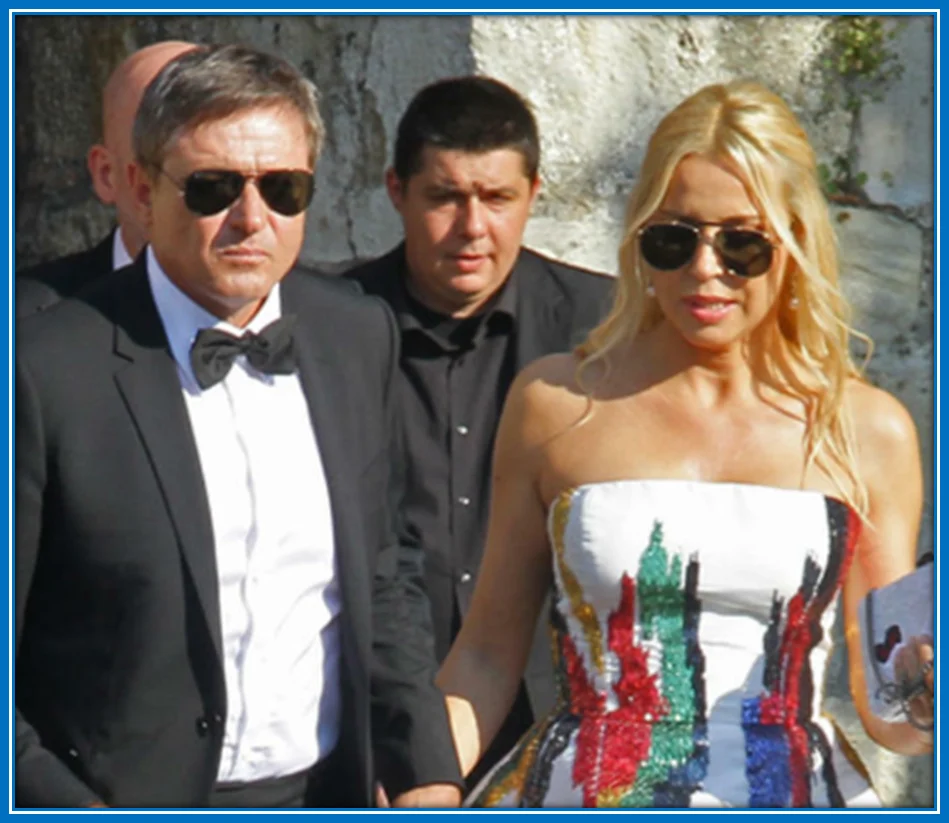
Dragan Stojkovic with his beautiful wife. Image Credit: Glossyespreso
Dragan Stojkovic’s Children:
The couple has three children: Anja Valente, Marko Stojkovic, and Andrea Stojkovic. They also have grandchildren, although the exact number is not known.
Dragan Stojkovic’s Daughter Anja Welcomes Two Children, India Rose and Kasia Ginza, with Whispers of a Third, While Rumors Surrounding Anja’s Sister Andrea’s Alleged Daughter Surface.
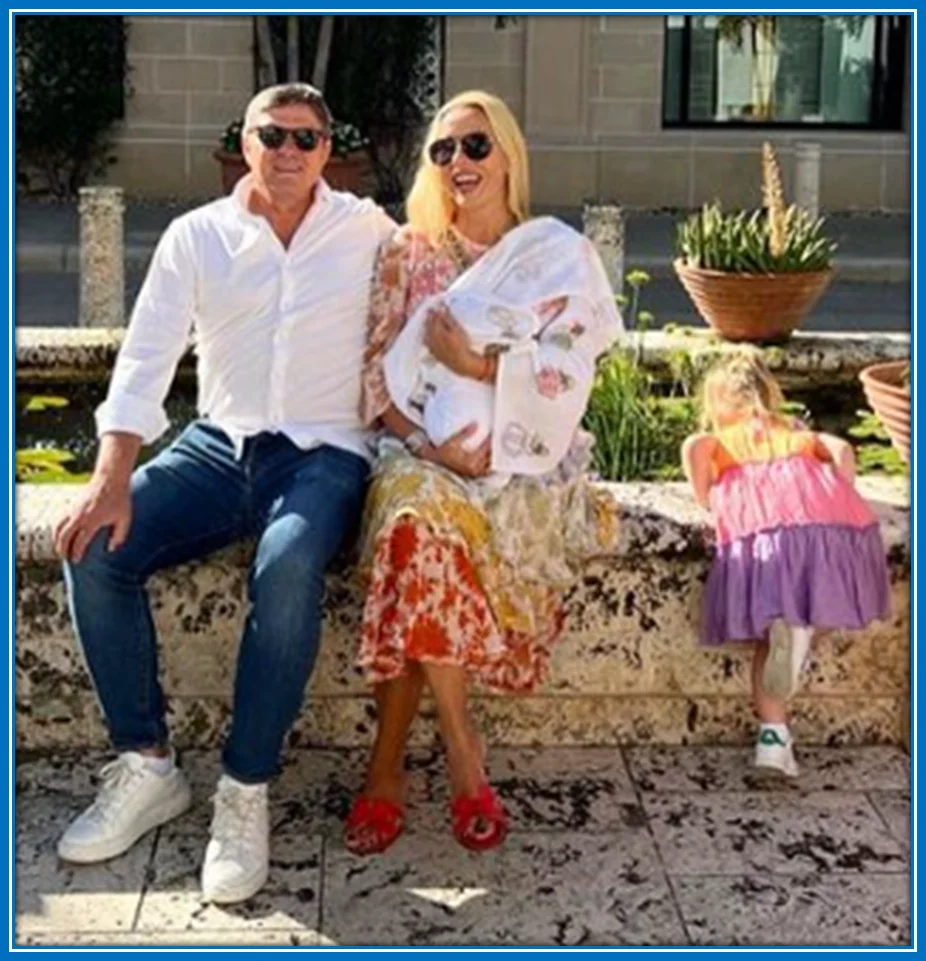
A pic of Dragan Stojkovic with his daughter and grandkid, Sienna. Image Credit: Instagram.com/draganstojkovicpixy/
Dragan Stojkovic Family Origin:
His household roots are traced back to Serbia, specifically to the village of Pasi Poljana in Nis, Serbia. Dragan, also known as Piksi, was born and raised there. His family has deep roots in the region. Besides, he grew up in the midst of the local community.
Stojkovic’s roots are firmly planted in his Serbian heritage. His village holds significance in his family’s history, serving as the backdrop for his upbringing and the beginning of his journey to football stardom.
Consequently, it’s correct to say that Dragan Stojkovic is from Serbia, officially known as the Republic of Serbia.
It is a landlocked country at the crossroads of Southeast and Central Europe. Simultaneously, he shares a close origin with the Croatia national team boss, Zlatko Dalic.
Piksi remains deeply connected to his roots despite his global success, and he regularly visits his hometown. He has maintained close friendships since his youth. Illustrating this aspect progressively, a visual aid will enhance your grasp of His cultural heritage.
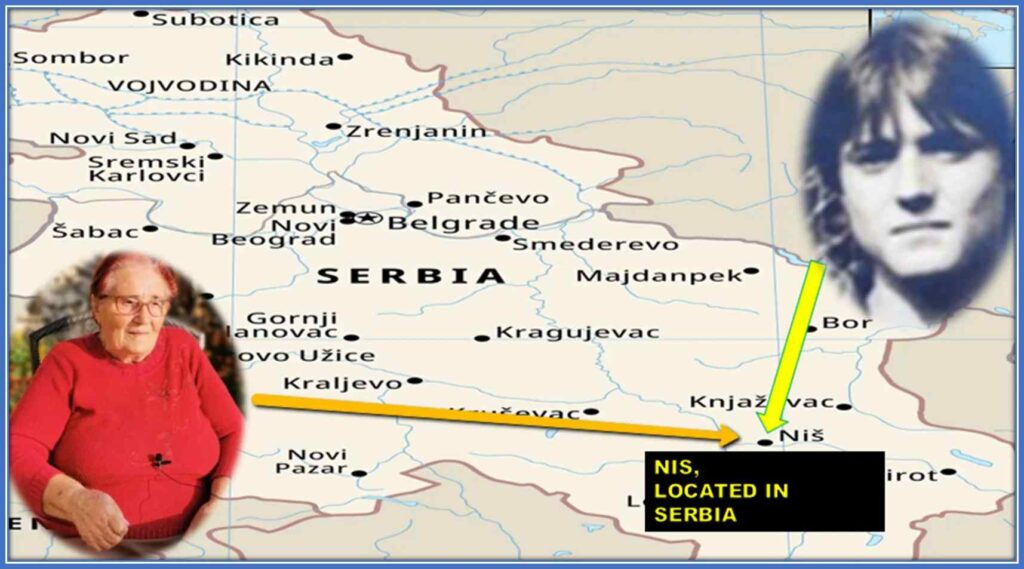
Delving into the Depths of Dragan Stojkovic’s Family Heritage. Photo Source: Britannica, Instagram.com/draganstojkovicpixy/
Dragan Stojkovic Ethnicity:
In Southern Serbia, particularly in regions like Nis, which is Stojkovic’s hometown, most of the population identifies as Serbian ethnically. They are considered white/Caucasian.
However, there are also smaller communities of ethnic Albanians, Roma, and other minority groups living in the region.
Dragan Stojkovic Education:
As a child, the youngster attended primary school in Serbia from the late 1960s to the early 1970s. In Yugoslavia, where Serbia was a part, primary education was mandatory. As such, it is provided free of charge to children between the ages of 7 and 14.
This foundational education typically spans eight years and covers various subjects, including mathematics, language, sciences, physical education, and arts. Following this, Dragan had the option to enrol in secondary school after his primary education.
Secondary education in Yugoslavia offered academic and vocational tracks, allowing students to specialize further in various fields depending on their interests and career aspirations.
However, it’s uncertain how far Dragan pursued formal education beyond primary school, as his athletic talents and passion for football became prominent during his youth.
Despite the uncertainty surrounding his formal education, it’s worth noting that Dragan maintained close friendships from his school days, including one with a friend nicknamed Gaci, as mentioned by his mother.
These friendships likely played a significant role in shaping his early years and remained important to him throughout his life.
Dragan Stojkovic Biography – Football Story:
The dashing Soccer Mastermind’s sporting journey began to take shape during his teenage years. He showcased his talent while playing in the youth system of FK Radnicki Nis.
Dragan made his debut at the tender age of seventeen under the guidance of head coach Dusan Nenkovic during the 1981-82 season.
Initially deployed as a midfielder and occasionally as a forward. He left an indelible mark on Radnicki Nis, making 70 appearances over four seasons and scoring eight goals.
His legacy as one of Yugoslavia’s most revered footballers was firmly established through his remarkable performances, particularly during the 1990 FIFA World Cup.
His unforgettable goals in crucial matches, such as the memorable clash against Spain, propelled him to legendary status within the football community.
Beyond his on-field exploits, Stojkovic’s impact transcended the boundaries of the pitch, inspiring countless fans and garnering widespread admiration for his extraordinary talent and exemplary sportsmanship.
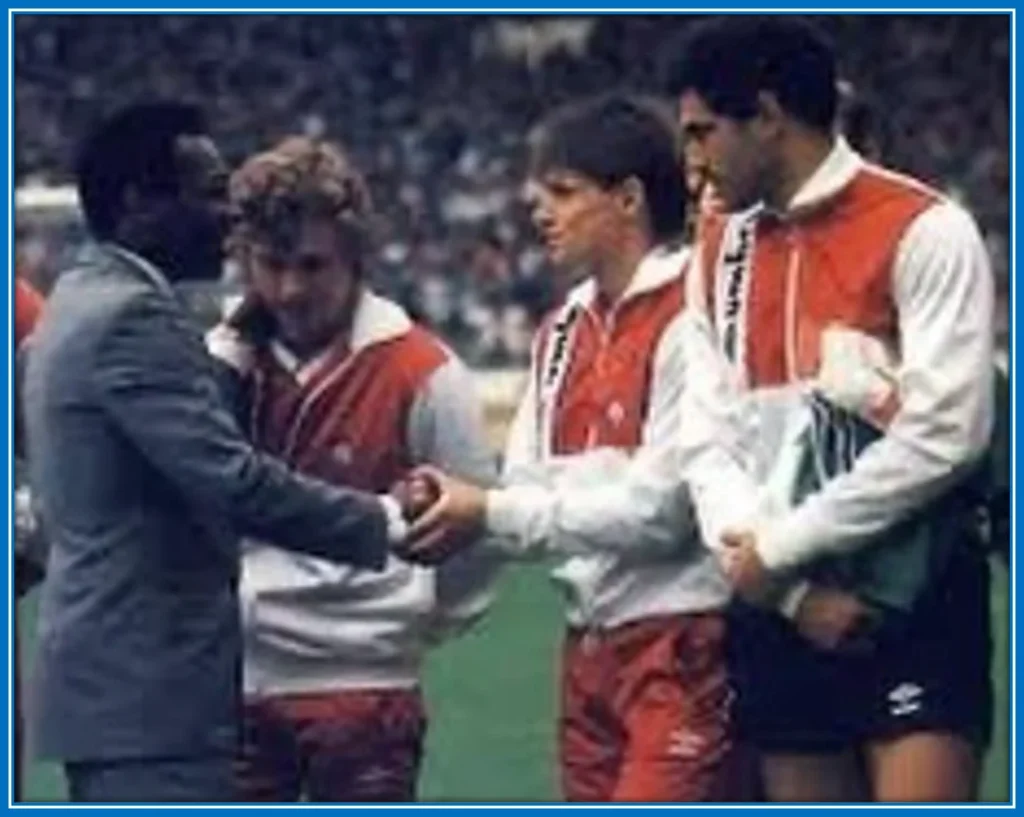
Dragan Stojkovic’s Early Days on the Field Captured in Time. Source: Instagram.com/draganstojkovicpixy/
Road to Fame Story:
According to Dragan Stojkovic Transfermarkt, his illustrious career record is a testament to his exceptional skill in the beautiful game.
From his early days at renowned clubs like Red Star Belgrade and Nagoya Grampus to his contributions on the international stage with the Yugoslavia, Serbia and Montenegro national teams. His statistics speak volumes about his prowess as a player.
As a result, his footballing genius got widely praised for his visionary playmaking, creative flair, precise passing ability, and mesmerizing dribbling skills, earning him the fitting moniker of “the Maradona of the Balkans.”
His remarkable talents and enduring impact on the sport served as a shining example of excellence and continue to resonate with football aficionados across the globe.
With each game played, goal scored, and assist provided, he carved out his place in football history, leaving behind a lasting legacy that inspires generations of football enthusiasts worldwide.
This period served as the foundation for his budding career. His performances caught the attention of large clubs, paving the way for him to make significant moves in his football career.
He joined Red Star Belgrade from 1986 to 1990. During his time with Red Star Belgrade, Stojkovic became a key player, making 120 appearances and scoring an impressive 54 goals.
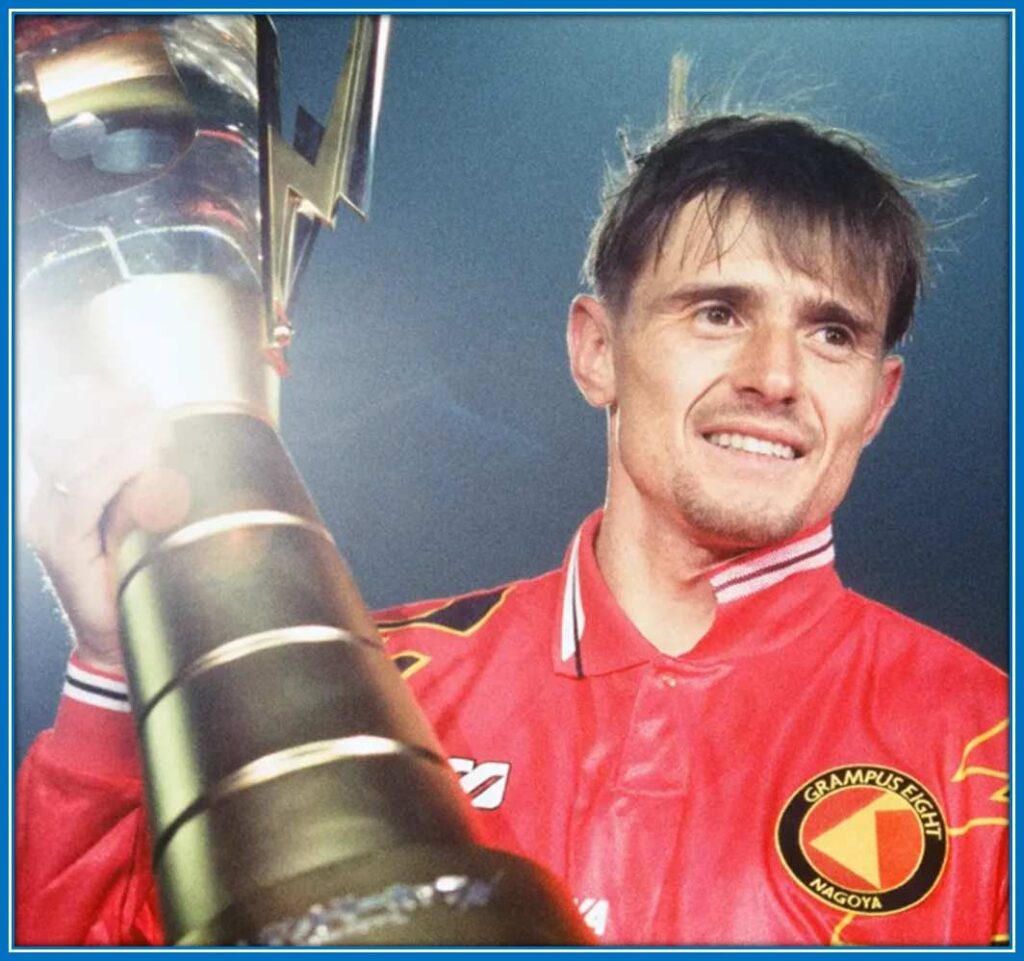
A happy moment in his early career. Photo Source: Sportsbrief
With the arrival of French coach Arsene Wenger in 1995, Dragan “Piksi” Stojković started to electrify the J1 League with his remarkable skill. He had precise passing abilities and deadly finishing. Here are all seven of Piksi’s goals during the 1st Stage of the 1995 season.
Dragan Stojkovic Bio – Rise to Fame Story:
After concluding his illustrious playing career, the football star transitioned into coaching. His journey began with administrative roles, first at the helm of the Yugoslavian Football Association and later as the president of Red Star Belgrade from 2005 to 2007.
However, it was in 2008 that he officially embarked on his coaching career, starting at his former club, Nagoya Grampus.
Despite concerns over his lack of coaching experience, Stojkovic led Nagoya Grampus to a 3rd place finish in his debut season, securing qualification for the AFC Champions League.
He succeeded further by guiding Nagoya Grampus to their first-ever J. League title in 2010, earning recognition as the J. League Manager of the Year. Stojkovic was appointed the Serbia national football team manager on his birthday, 3rd of March 2021.
Under his leadership, Serbia successfully qualified for the 2022 FIFA World Cup with a crucial 2-1 win over Portugal in the final match, with Aleksandar Mitrovic scoring the first goal and Dusan Tadic scoring the second.
In the 2022 World Cup, Serbia faced Brazil, Cameroon, and Switzerland in Group G. Despite a promising start, including a draw against Cameroon, Serbia finished 4th in the group and was eliminated from the tournament.
Ljubisa Tumbakovic got relieved of his duties as the Eagles’ coach. This led to Dragan Stojkovic’s appointment to guide the team until the conclusion of Euro 2024.
Personal Life:
Born under the sign of Pisces in March, Dragan Stojkovic possesses charm and romance, which are characteristic of this zodiac sign. Pisces is a complex and multifaceted sign characterized by its empathy, creativity, and sensitivity.
Footballers with the same Zodiac include Arda Guler (Attacking Midfield), Johan Bakayoko (Right Winger), Warren Zaire-Emery (Central Midfield), James Garner (Defensive Midfield), Kevin Nisbet (Centre-Forward), Ian Maatsen (Left-Back)
Standing around 5 feet 8.5 inches tall and weighing approximately 73 kg, he maintains a fit physique despite transitioning from a professional football career to coaching the national team.
With brown eyes and blonde hair, his features add to his charismatic appearance. Beyond his career in football, Dragan has diverse interests, including travelling, music, gaming, workouts, and swimming, as evidenced by his social media presence.
Football remains a lifelong passion, evident from his close friendships with fellow players. He values spending time with loved ones, especially his wife, children, and grandchildren, often prioritizing rest and relaxation to optimize his performance on the field.

A collage showing Dragan Stojkovic’s personal life. Image Source: Instagram.com/draganstojkovicpixy/, Instagram.com/draganstojkovicpixy/, Instagram.com/draganstojkovicpixy/
Lifestyle:
Revered as an iconic figure in Yugoslav and Serbian football history, he held the prestigious position of captain for both the Yugoslavia national team and Red Star Belgrade for an extended period.
His profound influence on the game and significant contributions solidify his status as one of the all-time greats in the footballing realms of both Yugoslavia and Serbia.
Stojkovic has amassed numerous accolades throughout his illustrious career, including the J.League Manager of the Year in 2010. He also emerged as the Sportsperson of the Year of Nis in 2010 and the Serbian Coach of the Year award in 2016 and 2021.
These achievements underscore his exceptional leadership and coaching prowess, highlighting his significant impact on Serbian football. With his growing influence and success, Stojkovic’s earnings would increase substantially.
This wealth affords him a lavish lifestyle characterized by luxurious mansions, extravagant vacations, fine dining experiences, and a collection of high-end automobiles.
Residing in Serbia with his wife, Dragan indulges in his passion for luxury cars, owning several expensive automobiles that reflect his status as a sports champion and symbolize his success in football.
Untold Facts:
In the concluding part of the rising soccer star’s narrative, we’ll delve into some intriguing aspects of the charismatic Serbian football manager and former player. So, let’s dive in without further delay.
Salary:
According to Finance Football, in the 2022 FIFA World Cup, Dragan was the 22nd highest-paid manager. As such, making €650,000 a year. This is a big jump from the last World Cup when Mladen Krstajic was the 3rd lowest paid at €300,000.
Comparing Salaries Of Head Coaches In the 2022 FIFA World Cup, The highest-paid manager is Hans-Dieter Flick from Germany, earning €6.5 million yearly.
Gareth Southgate from England follows with €5.8 million annually. Didier Deschamps, leading the French national team, earns €3.8 million yearly.
Brazil’s coach, Tite, earns €3.6 million. Other top earners include Louis Van Gaal from the Netherlands, Gerardo Martino from Mexico, Lionel Scaloni from Argentina, and Fernando Santos from Portugal, all making between €2 million and €3 million per year.
Among African teams, Vahid Halilhodzic from Morocco is the highest-paid coach at €920,000 per year. Chris Hughton, coaching Ghana, earns €400,000 annually.
Rigobert Song from Cameroon earns €340,000 a year, and Aliou Cisse from Senegal makes €310,000 annually. Tunisia’s coach, Jalel Kadri, earns at least €130,000 annually.
Dragan Stojkovic Religion:
The Football Boss follows the Christian faith, but it’s unclear if he’s Catholic, Orthodox, or Protestant. However, in Serbia, most people are Eastern Orthodox (84.6%), while 5% are Catholic, and 1.0% are Protestant.
Summary EndNote:
Embarking on the Riveting Journey of Dragan Stojkovic. Also, unravelling the Legacy of a Serbian Football Maestro and Mentor.
He was born on the 3rd of March 1965, amidst the vibrant city of Nis in SR Serbia, SFR Yugoslavia. Dragan Stojkovic emerged as a beacon of football brilliance, nurtured by the love and guidance of his parents, Dobrivoje and Desanka.
Nestled within the close-knit community of Pasi Poljana near Nis, young Dragan’s fervent love affair with football blossomed, laying the foundation for a storied career that would transcend borders and captivate hearts around the globe.
Affectionately dubbed “Piksi” after a beloved character from the renowned cartoon “Pixie and Dixie and Mr. Jinks,” Dragan’s journey was marked not only by his prowess on the pitch.
But also by his linguistic prowess, mastering languages including English, French, Italian, and even some Japanese.
Dragan ascended to iconic status throughout his illustrious career, donning the captain’s armband for the Yugoslavia national team and the revered Red Star Belgrade.
His indelible mark on Yugoslav and Serbian football history was undeniable, etched in the annals of sporting greatness.
Dragan’s brilliance shone brightly on the international stage. He represented Yugoslavia with distinction at the prestigious FIFA World Cups of 1990 and 1998, captivating audiences with his flair and finesse.
Dragan’s resilience and tenacity remained unyielding, earning him adoration, particularly in Japan, where he showcased his exceptional talents.
Stojkovic transitioned seamlessly into coaching in a remarkable chapter of his career, assuming the helm of the Serbia national team in 2021.
Under his astute leadership, the team soared to new heights. As a result, securing qualification for the 2022 FIFA World Cup and UEFA Euro 2024. Also, this further cements his revered mentor and strategist status.
Journey Beyond Football:
Outside the realm of Soccer, Dragan Stojkovic’s personal life blossomed alongside his professional pursuits.
He found love and companionship in Snezana. Thus, together, they nurtured a growing family, blessed with daughters Anja and Andrea, son Marko, and the joy of grandchildren.
Dragan Stojkovic’s life is a testament to the enduring power of passion, perseverance, and the profound impact of family and community.
Appreciation Note:
We thank you for taking the time to read our article about Dragan Stojkovic. Your interest and support mean a great deal to us. We’re glad you enjoy our ongoing coverage of exciting European football stories.
Dragan Stojkovic’s biography is included in our football bosses collection, which contains the stories of top managers like Vlatko Andonovski and Steve Clarke. If you have any more questions, please feel free to contact us.
In addition to Dragan Stojkovic’s biography, we have other exciting football stories for Serbian football enthusiasts to enjoy. You might find the life histories of Luka Jović and Djordje Petrovic particularly interesting.


